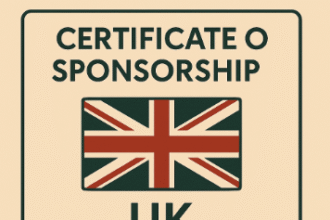Introduction to UK Visa Sponsorship

UK visa sponsorship is a crucial mechanism that allows skilled professionals from abroad to secure employment in the United Kingdom. This process permits employers in the UK to employ foreign nationals by providing them with the necessary sponsorship to obtain a visa. Essentially, visa sponsorship serves as a gateway for foreign workers, enabling them to contribute their skills and expertise to the UK labor market while adhering to immigration regulations.
The significance of UK visa sponsorship cannot be overstated. It plays a vital role in addressing skill shortages in various industries, thereby enhancing the country’s economic development. For foreign professionals, particularly those with in-demand skills, UK visa sponsorship not only opens doors to job opportunities but also offers a pathway to a fulfilling career and life in the UK. Consequently, understanding the intricacies of the sponsorship process is essential for any skilled worker considering relocation to the UK.
There are various types of visas available under the UK visa sponsorship framework. The most commonly sought-after are the Skilled Worker visa and the Global Talent visa, among others. The Skilled Worker visa allows individuals to seek employment in a specific role offered by a UK employer who holds a valid sponsorship license. On the other hand, the Global Talent visa targets highly skilled individuals with exceptional talent in their respective fields, providing them with the flexibility to work in the UK without the need for a job offer at the initial stage.
To obtain sponsorship, candidates must meet certain requirements, including having a valid job offer from an approved UK employer, and fulfilling specific eligibility criteria that may include skill level and proficiency in English. Overall, grasping the fundamentals of UK visa sponsorship is essential for skilled professionals aspiring to work in the UK, as it outlines the initial steps toward achieving their career goals abroad.
Eligibility Criteria for Skilled Workers
To qualify for UK visa sponsorship as a skilled worker, applicants must meet several specific criteria set forth by the UK government. These criteria are designed to ensure that only qualified professionals are granted access to the UK job market. One of the foremost requirements is obtaining a valid job offer from a UK employer that holds a sponsorship license. The offered position must be listed on the UK Shortage Occupation List or fulfill specific skill level requirements, generally categorized as RQF Level 3 or above. This ensures that the role is considered skilled work, making the prospective employee eligible for sponsorship.
Moreover, skill levels of the job offered are critically evaluated. The applicant must possess the requisite skills or qualifications that correspond to the position. Employers are also responsible for adhering to salary thresholds, which stipulate a minimum annual salary that must be offered to the skilled worker. As of recent regulations, the general salary threshold is set at £26,200 per year or the ‘going rate’ for the occupation, whichever is higher. This is instrumental in determining whether an applicant is eligible for a sponsorship visa.
English language proficiency is another vital criterion for skilled workers seeking sponsorship in the UK. Aspiring applicants must demonstrate their command of the English language by achieving a recognized score on approved tests such as IELTS, or by having an academic qualification taught in English. This requirement is significant as it facilitates effective communication in the workplace, contributing to a successful transition for foreign skilled professionals into the UK labor market.
Thus, meeting these eligibility criteria—job offer requirements, skill levels, appropriate salary thresholds, and English language proficiency—is essential for skilled professionals aiming for UK visa sponsorship. Each factor plays a pivotal role in the application process, shaping the opportunities available to applicants.
Understanding the Sponsorship Process
Securing a UK visa sponsorship is a crucial step for skilled professionals seeking employment in the United Kingdom. The sponsorship process can be viewed from both the employer’s and the employee’s perspectives, each with distinct responsibilities and requirements. For employers, the journey begins with obtaining a license to sponsor workers. This involves applying to the Home Office for a sponsorship license, which demonstrates the employer’s commitment to compliance with immigration laws and regulations.
To become a licensed sponsor, employers must meet certain criteria, including providing evidence of their capability to fulfill their sponsorship duties. This may encompass demonstrating a genuine job offer, adherence to salary thresholds, and showcasing their efforts to recruit domestically. Documentation such as company registration details, financial records, and proof of the business’s operational status will typically be required during this application process.
Once licensed, the employer gains the ability to assign Certificates of Sponsorship (CoS) to prospective employees. Each CoS is unique and must contain information about the sponsored role, such as the job title, description, and salary offered. Employers must ensure that their CoS aligns with the requirements of the Skilled Worker visa application.
From the employee’s perspective, the process starts once they receive the CoS from their employer. The individual can then apply for the Skilled Worker visa, using the information provided in the CoS as a basis for their application. Necessary documentation for the visa application may include proof of English language proficiency, evidence of sufficient funds, and a criminal record certificate, among other requirements.
Throughout this process, transparency and compliance with immigration rules are paramount for both the employer and employee to successfully navigate the visa sponsorship journey. By understanding each step, both parties can contribute to a seamless and efficient application experience.
Types of Visas for Skilled Professionals
For skilled professionals wishing to work in the UK, the visa landscape offers several options tailored to meet the diverse needs of various fields. Among the most prominent is the Skilled Worker visa, which allows individuals to accept job offers from UK employers who hold a valid sponsorship license. This visa is aimed at skilled workers in occupations that are in demand, emphasizing the requirement of a job offer and a minimum salary threshold, which is crucial for both the applicant and the sponsoring employer.
Another significant pathway is the Global Talent visa, designed to attract individuals who are leaders or potential leaders in specific sectors such as academia, arts, and digital technology. This visa does not require a job offer, providing flexibility for exceptionally skilled individuals to pursue opportunities that align with their career aspirations. Applicants must demonstrate a proven track record of achievement in their respective fields, ensuring that only the most qualified candidates pursue this prestigious option.
In addition to these, the UK also offers the Health and Care Worker visa, which specifically targets healthcare professionals. This visa category not only facilitates entry into the UK but also reduces visa fees, reflecting the urgent demand for healthcare workers due to ongoing public health challenges. The application process for this visa is streamlined, typically resulting in faster processing times.
Each visa category has distinct benefits and requirements, shaping the overall application process. For instance, while the Skilled Worker visa requires sponsorship and a specific job offer, the Global Talent visa emphasizes individual achievements. Understanding these differences is crucial for skilled professionals aiming to navigate the UK visa system efficiently and effectively. This knowledge will enable potential applicants to select the most appropriate visa pathway suited to their qualifications and career goals.
The Role of Employers in the Sponsorship Process
In the context of UK visa sponsorship for skilled professionals, the obligations and responsibilities of employers are paramount. Employers wishing to sponsor overseas skilled workers must first obtain a sponsorship license from the UK Home Office. This process begins by demonstrating the legitimacy of the business and the need for a skilled worker that cannot be fulfilled by the local labor market. Detailed documentation must be prepared, showcasing the company’s adherence to employment laws and its capability to meet the requirements set forth by UK immigration regulations.
Once a sponsorship license is granted, employers assume the role of ‘sponsor,’ which comes with various obligations. It is crucial to ensure compliance with the UK immigration laws not only at the application stage but throughout the duration of the sponsorship. Employers must actively monitor the immigration status of their sponsored employees, ensuring that all conditions of their visas are adhered to. This includes verifying that the employees are working in the roles specified in their Certificates of Sponsorship (CoS) and not breaching any conditions of their visa.
Moreover, maintaining accurate records is essential. Employers are required to keep comprehensive documentation regarding the employee’s performance, attendance, and any changes to their employment status. This not only serves as a defense in the event of a Home Office audit, but it also underscores the company’s commitment to meeting its obligations under the sponsorship framework. Failure to comply with these responsibilities can lead to serious repercussions, including the revocation of the sponsorship license, which may hinder the company’s ability to recruit talented individuals from outside the UK.
In summary, employers play a crucial role in the UK visa sponsorship process for skilled professionals. From securing a sponsorship license to maintaining compliance and monitoring employees, their diligence is vital for a successful sponsorship experience.
Common Challenges and Obstacles
The visa sponsorship process for skilled professionals in the UK presents several challenges for both the applicants and employers. Understanding these obstacles is crucial for a smoother transition into the UK workforce. One of the primary challenges is meeting the salary thresholds set by the UK government. Employers must ensure that the salaries offered to sponsored employees meet specific minimum requirements. Failure to comply can lead to visa rejections, placing significant pressure on employers to balance competitiveness with compliance.
In addition to salary limits, delays in the processing of paperwork can hinder the ability of skilled professionals to secure employment swiftly. The application process involves numerous steps—such as obtaining a Certificate of Sponsorship and submitting immigration application forms—each subject to potential delays. Furthermore, the waiting period for visa approvals can disrupt workforce planning for employers, making it essential to initiate the process as early as possible.
Changes in immigration policies also pose a significant challenge. The evolving landscape of UK immigration law can affect both skilled professionals and their employers. For instance, the introduction of new regulations may impose stricter criteria for sponsorship, or alter existing guidelines surrounding permitted occupations. It is vital for both parties to remain informed about any changes that may impact their plans. Employers can benefit from establishing a relationship with immigration advisors or legal experts to navigate these complexities effectively.
To mitigate these challenges, proactive communication between employers and potential employees proves invaluable. Employers should provide clear expectations regarding salary, the recruitment timeline, and any policy changes. For skilled professionals, staying informed about the latest immigration updates and engaging in thorough preparation before applying can significantly enhance the likelihood of a successful visa sponsorship experience.
Post-Visa Sponsorship Considerations
Once skilled professionals have secured their UK visa sponsorship, there are several essential factors to consider that will impact their experience in the United Kingdom. Understanding these considerations is fundamental to making the most of one’s stay and navigating any potential challenges.
One of the primary concerns for sponsored employees is the process of extending their visa. Visa holders should be aware of the specific conditions associated with their current visa and the timeline for application submission. The extension process typically requires continued employment at the sponsoring organization and adherence to the stipulations outlined by the Home Office. Professionals should proactively engage with their employer’s human resources department to ensure timely submission of their visa extension application, avoiding any interruption in their legal residency status.
Additionally, sponsored professionals may aspire to apply for Indefinite Leave to Remain (ILR), which allows individuals to reside in the UK without time limitations. To qualify for ILR, candidates must meet certain criteria, such as having lived in the UK for a designated period while holding a valid visa and demonstrating proficiency in the English language. It is vital to prepare documentation that supports this application, including proof of employment and residence. Professionals should aim to familiarize themselves with the ILR requirements and begin preparing well in advance of their eligibility date.
Furthermore, understanding the rights and responsibilities of a sponsored employee is crucial. While working in the UK, sponsored professionals have rights such as the entitlement to fair payment, protection against discrimination, and access to medical services through the National Health Service (NHS). Conversely, they must comply with the conditions of their visa, including maintaining employment and not violating any immigration laws. Recognizing these rights and obligations fosters a harmonious work environment and ensures a smooth residency experience in the United Kingdom.
Impact of Brexit on Visa Sponsorship
The United Kingdom’s withdrawal from the European Union, commonly referred to as Brexit, has significantly influenced the landscape of visa sponsorship for skilled professionals. Prior to Brexit, the freedom of movement allowed EU citizens to reside and work in the UK without the need for visas. However, the end of this policy has prompted a comprehensive overhaul of immigration regulations, resulting in a more structured visa sponsorship system that applies to both EU and non-EU nationals.
Under the new immigration framework instituted post-Brexit, the UK has adopted a points-based system intended to treat all foreign workers uniformly. This means that skilled EU professionals seeking employment in the UK must now adhere to the same visa requirements as their non-EU counterparts. Employers who wish to sponsor skilled workers need to obtain a sponsorship licence from the Home Office, demonstrating that they can provide a supportive environment for international staff and fulfill specific criteria related to job vacancies and salary thresholds.
The introduction of the Skilled Worker visa is one of the most notable changes following Brexit. This visa allows individuals with a job offer from an approved employer to reside in the UK. Applicants must secure a minimum number of points based on their job offer, skill level, and English language proficiency. This change has transformed the process for recruiting skilled professionals, emphasizing the necessity for UK employers to navigate a more complex visa sponsorship process effectively.
Consequently, the implications of Brexit on visa sponsorship are significant, as they have reshaped the recruitment landscape for skilled workers in the UK, making it imperative for both employers and prospective employees to understand the newly established immigration policies and procedures. This transition underscores the importance of adapting to evolving guidelines in a post-Brexit environment.
Conclusion and Next Steps
In summary, embarking on a journey to work in the UK through visa sponsorship can be a transformative opportunity for skilled professionals. Throughout this guide, we have examined various aspects of the UK visa sponsorship landscape, including the types of visas available, the eligibility requirements, and the application process. Understanding these elements is crucial for making informed decisions regarding your migration to the UK.
As you contemplate this significant career move, it is essential to thoroughly explore your options. Start by identifying the skills and qualifications that are in demand within your desired industry in the UK. The UK Home Office provides a comprehensive list of eligible occupations, which can serve as a vital tool during your planning. Additionally, consider reaching out to potential employers who are authorized sponsors to learn more about their specific requirements and sponsorship capabilities.
Consulting with immigration experts can also be extremely beneficial. Professional guidance can provide clarity on the complexities of UK immigration policies and help tailor your application to meet the necessary standards. Furthermore, immigration consultants can assist you in preparing documentation, which is a crucial step in ensuring a smooth application experience.
Moreover, preparing for your potential relocation should begin as soon as possible. This includes not only securing your visa sponsorship but also considering aspects such as accommodation, financial stability, and cultural integration. Investigating support networks for international professionals can significantly ease the transition process and foster a sense of community in your new environment.
By proactively taking these steps, you will enhance your chances of successfully navigating the UK visa sponsorship process and embarking on an enriching professional journey in the UK.



